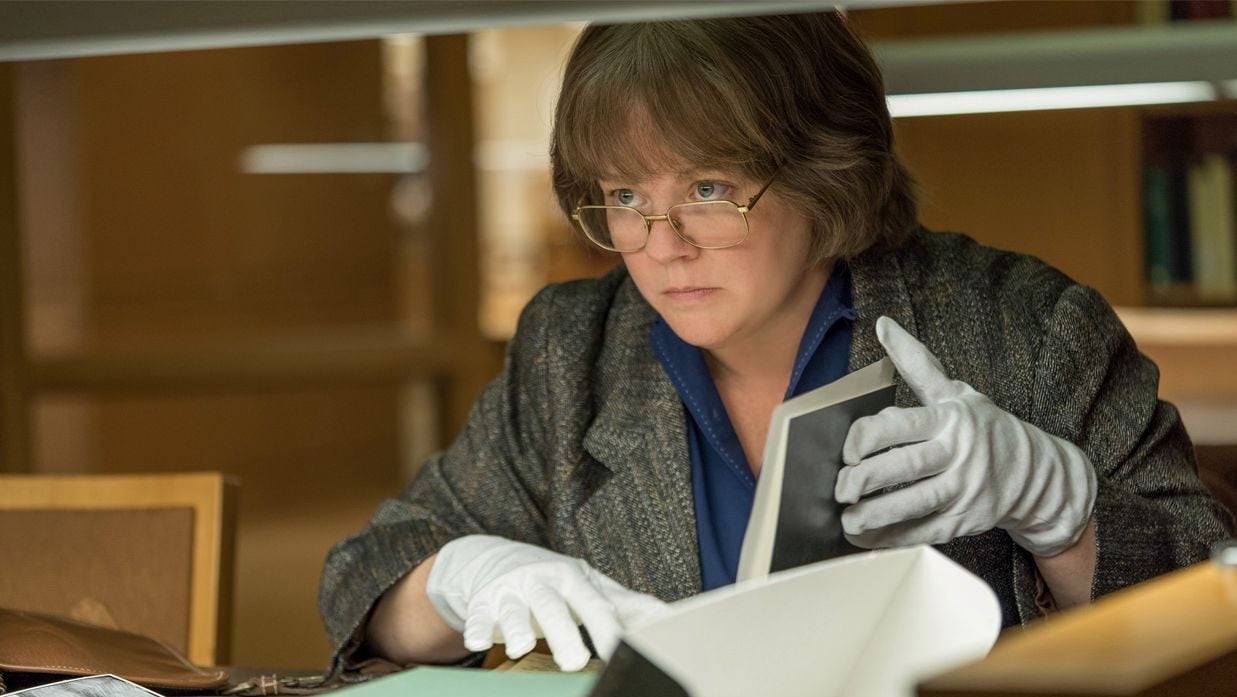The strange, true-life story of the literary scammer Lee Israel
This story contains spoilers for Lee Israel’s memoir, Can You Ever Forgive Me? and its film adaptation.


This story contains spoilers for Lee Israel’s memoir, Can You Ever Forgive Me? and its film adaptation.
Lee Israel was washed up. At age 50, the writer and biographer’s book ideas weren’t selling, and she wasn’t even being invited to martini lunches in Manhattan to get turned down. The woman who had profiled Katharine Hepburn and had a book hit the New York Times bestseller list was desperate.
In Can You Ever Forgive Me? out in US theaters yesterday (Oct. 19), Melissa McCarthy plays the disheveled real-life writer, who died in 2015. In her 2008 memoir of the same name, Israel describes the lengths she went to to make money once she had no book prospects, had been fired from several low-level editorial jobs, and was on welfare with a sick cat whose treatment she couldn’t afford.
That’s when Israel’s proclivity for gin-fueled prank phone calls to people who’d wronged her morphed into a brief but successful career as a literary forger.
In 1990, the real-life Israel started forging letters from famous writers, drawing on existing letters and blending the writers’ idiosyncrasies with real-life events. She made a light box from her broken TV, which let out just enough of a glow that she could trace signatures from letters she had photocopied from the library. Between 1990 and 1991, she estimates that she wrote 400 fake letters, selling them for a hundred dollars a piece (about $180 today) at the height of her scam.
Israel’s letters are from writers and entertainers from the first half of the 20th century, gossipy and snide of the sort more likely to thrill a dealer than a casual reader. “[Julie Andrews] is a bright, talented actress and quite attractive since she dealt with her monstrous English over-bite,” she writes, for example, as the English playwright, Noël Coward. (Andrews starred in a movie about Gertrude Lawrence, whom Coward was friends with.) She impersonated the American poet Dorothy Parker and the actor Louise Brooks, among others.
“My success as a forger was somehow in sync with my erstwhile success as a biographer,” wrote Israel. “I had for decades practiced a kind of merged identity with my subjects; to say I ‘channeled’ is only a slight exaggeration.”
By the following year, dealers were catching on to Israel’s forgeries, and she was forced to scheme anew. That’s when she ran into Jack Hock, played by Richard E. Grant in the film, a serial grifter who once tried to sell the movie rights to one of Israel’s books well after his option expired, using a signature he had forged (and misspelled).
The two cooked up a second swindle: Israel would visit university libraries with rare collections, copy a letter by hand, go to her hotel and type up an exact replica, then return to the library to switch the real copy for her duplicate. Hock then sold the real copies to dealers. A batch of letters from Margarett Mitchell, who wrote Gone with the Wind under the name Peggy Mitchell, went for $2,000.
After a few months, the FBI came knocking.
The tenor of Israel’s memoir is one of relish. Even in her worst moments—her apartment infested with flies, an exterminator disgusted to the point of refusing to enter—she’s smug, amused, and confident, and sees herself as a true talent, unjustly toppled from literary grace.
Israel is largely unrepentant well through her court appearance, and is upfront about the fact that her privileged status as a white writer let her glide through the system more or less unscathed. (“My crime, in lawyers’ talk, was a sexy crime,” she wrote.)
Her story seems made for the big screen, with its larger-than-life cast, 10-dollar-vocabulary, and sweet literary burns. And Israel, the star of her own tale, is a compelling protagonist. She remains convinced that her crimes were hilarious shenanigans that hurt no one in the end, and that they revealed her true genius as a biographer. On the whole, she’s not sorry at all.